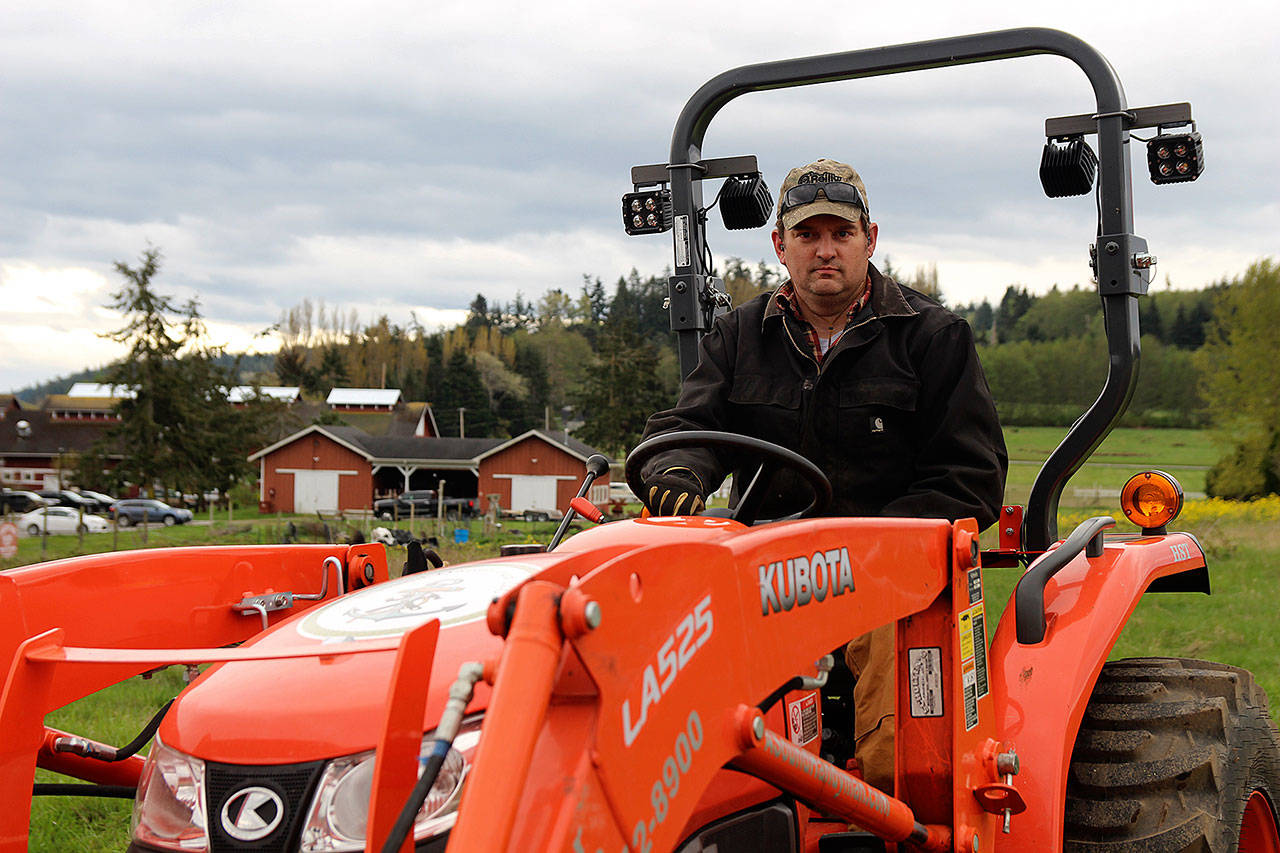Turning and sifting the rich, dark soil of Greenbank Farm in the palm of his hand, Mark Stewart gazes down at it in approval.
“There’s a lot of organic matter here,” he said. “It’s alive. People don’t believe that soil has life, but it does.”
The freshly tilled earth has proven fertile and ready to sprout new life, which is good news for Stewart and several other Whidbey Island residents who have recently teamed up to launch a new program that will pair veterans with farming.
The newly formed coalition, Boots to Roots, is now leasing five acres of land at the Greenbank Farm and will eventually become a full-fledged, free veteran education program, teaching former members of the military to grow their own plants, properly care for agriculture and connect with each other.
Currently, Boots to Roots has four board members: there’s veteran Mark Stewart, veteran Kyle Flack of Bell’s Farm, farmowner and Whidbey Island Conservation District board member Anza Muenchow, and Whidbey Veterans Resource Center coordinator and veteran Dana Sawyers.
They plan to grow pumpkins, raspberries, sunflowers and more, Stewart said. As a nod to Greenbank Farm’s history, they may also put in some loganberries, he said.
The group began forming in the winter, with Stewart and the others coming together with a desire to utilize Greenbank’s untapped agricultural land and bring together veterans.
Greenbank Farm offered the opportunity to make Boots to Roots a reality.
The program has taken inspiration from other, similar programs such as the national “Armed to Farm” program, which provides free training to veterans on all things agricultural.
With the country’s aging generation of farmers eventually requiring replacement, veterans make a good population to potentially grow the food of the future, Muenchow said.
“I think veterans are great because they care about security — national security — and food is a big part of that,” she said.
They get the outdoor (requirements) and timeliness of farming. Farming is not “whenever you feel like it,” Muenchow said.
The task-oriented work, the focus required and the driven-mentality of veterans all translate well to the requirements of farming and gardening, Flack said.
“A lot of the veterans, when they get out of military, are ready to get their independence back,” Flack said. “I think agriculture is a really good way to do that.”
Not to mention, a program that brings together people of similar backgrounds will create a sense of community and teamwork, according to Sawyers.
“That’s something that veterans really miss once they separate from the military,” she said. “Frequently, people talk about how they miss their team.”
Sawyers envisions the program as being able to help veterans earn employment skills and teach them practices that could help with running small businesses.
“There is something very rewarding about working with the earth, producing a product and seeing the benefits go to your friends and family,” Sawyers said.
Long term, they will eventually work on developing a curriculum and bring in experts whenever possible to educate veterans, Stewart and Flack said. So far, they’ve established connections with the Master Gardeners and WSU Extension programs. The Master Gardeners donated $800 for the group to use toward purchasing tools, Flack said.
“We are just beginning and are trying to get our feet under us and get rolling,” Flack said.
Once they’re established, they want to offer free classes to veterans, weekend training sessions, internship-style seasonal training as well a fruitful farm, Flack said.
For now, the team members are working to establish their roots, develop workshops and get some crops growing. They’re also looking for volunteers and seeking people interested in becoming board members. So far, they’ve hosted two work parties that successfully brought in a handful of interested volunteers.
They hope to hear from veterans interested in working on establishing and maintaining the farm, even if it’s only for a few hours a week.
“It’s a farm. There’s always something to do,” Stewart said.
Some plans for the near future include a public Barn Dance fundraiser in September, Stewart said.
“We want to grow community, that’s what we want to do,” Stewart said. “It’s up to veterans to tell us what they want.”
• To learn about upcoming Boots to Roots events, to volunteer or find out more information, contact info@bootstorootswhidbey.org or visit the website at www.bootstorootswhidbey.org or follow the Facebook page, Boots to Roots Whidbey Island.



